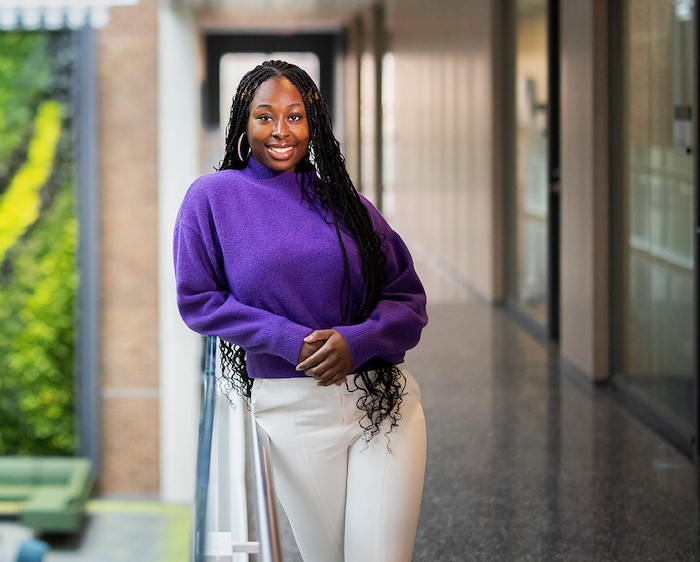
A program, launched by recent Penn grads Taussia Boadi and Cheryl Nnadi provides academic support to middle school students affected by gun violence.
Recent College of Arts and Sciences grads Taussia Boadi and Cheryl Nnadi connected right away during their first year at Penn. They are both native New Yorkers—Boadi from Westchester, Nnadi from Queens—who have focused on educational equity through community service since their high school days.
So when Nnadi, a criminology major, heard about the Projects for Progress (P4P) awards, she called Boadi right away, knowing it could be an opportunity for the two to put their passions into a program of their own creation.
Their project, Positioned for Success, was a 2023 P4P winner and is aimed at providing academic support to Philadelphia middle school students involved in the welfare system and affected by gun violence. The goal is to boost academic performances and break the pattern of vulnerable Black youth entering the juvenile justice system. They were advised by mentor Ariane Thomas, director of the Professional Counseling Program in the Graduate School of Education.
“We wanted to give these kids a support system outside of their home or school network by bringing in college students who look like them, who are high achievers and who have come very far despite their background,” says Boadi, who just graduated with a degree in sociology. “We wanted to let the kids that we’re mentoring know that they, too, can overcome and they, too, can fulfill their goals and dreams and achieve the things that they want to achieve.”
Their approach was four-pronged, focusing on academic enrichment such as homework help, high school preparation and application help, mentoring from the one-on-one engagement with other Penn volunteers, and what they call ”experience normalization.”
“We understood that the students we work with might not have the opportunity to engage in the same activities their wealthier peers might. So, we planned trips to Penn’s campus, Six Flags, and museums around the city,” Boadi says. “We wanted to allow them to just experience life and be middle schoolers and have fun.”
Unveiled in 2020, the Projects for Progress are managed by Penn’s Office of Social Equity & Community, which distributes as much as $100,000 each to chosen teams of Penn students, faculty, and staff working to promote equity and inclusion in Philadelphia by addressing topics like health care, education, systemic racism, and environmental justice.
The program got underway last semester with about 15 students and the same number of mentors. They helped with homework, played games to boost critical thinking skills, and on Saturdays took the students out for a mix of educational and just plain fun activities, including visits to the Penn Relays, the Barnes Museum, the Museum of Illusions, and Six Flags.
“Seeing them have an increased dedication to doing their homework and actually having fun with some of the assignments that we give them has been so rewarding,” Nnadi said. “A lot of them have come back to us with their report cards saying, ‘Look at my grades! They’ve increased!’”
It wasn’t just grades that were going up. Attendance was as well.
Boadi told a story of one student who told her that, because her mom works night shifts, she has to watch her siblings, and by the time her mom gets home she sometimes can’t get to school until almost 11 a.m., so she would just stay home on those days. “But she told me that on Wednesdays she tells her mom she needs to be at school for the program. And she said that what we do is what she looks forward to and that’s what helps get her through the week,” Boadi says. “I think that’s a sentiment that has been common among our cohort. They want to come to school, and they want to be there for the programming, and they want to be better students.”
Addressing educational inequity
Thomas says she was immediately inspired by Boadi’s and Nnadi’s passion and personal commitment to the project. “Taussia and Cheryl came to me with an idea and asked me to join them on this journey; it was honestly the first time I worked closely with Penn undergraduates,” she says. “Throughout the year, I’ve witnessed their professionalism and leadership in action. They inspired their peers, mentored them and the middle schoolers, and will leave a strong legacy of service to the community. But even more importantly they built a family and laid the foundation for a long-lasting impact on the lives of both the children and the mentors.”
Nnadi says that taking classes at Penn that gave her the opportunity to explore the problem of educational inequity has also increased her dedication to the cause. She ran a similar program in her neighborhood in Queens and says she feels passionately about achieving educational equity because of her personal experience living in an underfunded community while attending high school in an affluent neighborhood.
She received a scholarship to attend classes at a test preparation center that helped her gain admission into her high school, and attending that high school helped her gain admission to Penn. “My pathway was influenced by one person taking a chance on me. That’s something I wanted to provide for other students,” Nnadi says.
Boadi took inspiration from a writing seminar her first year at Penn called Saving Schools, and she did her final project on restorative justice and how policing in schools is hurting educational outcomes for students of color. “For this program, we wanted to get kids who aren’t in the juvenile justice system to participate so that we’re able to improve their outcomes,” she says, “because they are at a very high risk. Black students especially are at high risk of entering that system of being funneled through there because of the way policing happens in schools.”
Just before Commencement, the duo wrapped up programming with their first cohort, which was based at Comegys Elementary School.
The last day of our program was extremely emotional for all involved, they said. “The kids were like, ‘Wait, like, this is the last session? Can we please meet again?’ Just begging and a lot of tears were shed,” Boadi says.
Even though Boadi and Nnadi have graduated, a group of dedicated mentors plan to continue the project in the next year. They both hope Positioned for Success can become a Penn club at some point, to help support it financially.
Nnadi says their success is a great message for anyone at Penn who “has that big crazy idea that they believe is unachievable.”
“When we found out we won this prize, we were in utter shock,” she says. “And now a year later, we’re again in utter shock about how far our program has come and are excited to see what the future holds for Positioned for Success.”





